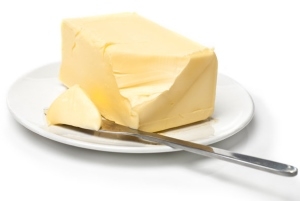Buttering you up with fat lies

This time the study, published in the British Journal of Medicine, re-examined old data taken from a nursing home and six state mental hospitals in Minnesota in the US between 1968 and 1973. In the study, the health effects of replacing butter with corn oil were investigated.
Butter is a very rich source of saturated fat (we all know that’s bad!) while corn oil is a polyunsaturated vegetable fat – which is what we are told we should be replacing animal fats with – or is it?
The results of the study were somewhat unexpected in that although cholesterol rates dropped in the corn oil-eaters, there was no drop in heart disease or risk of death for those avoiding butter. The authors of the study concluded that there has been an over-estimation of the benefits of replacing saturated fat with vegetable oils that are rich in linoleic acid. And THAT is the key issue here…
Linoleic acid is an omega-6 fat found in corn and sunflower oil. Other oils such as soya, rapeseed and flaxseed (or linseed) oils are a rich source of linolenic acid, an omega-3 fat (olive oil is out of the picture here as it is a rich source of oleic acid, an omega-9 fat).
Recent changes in the diet have led to a massive increase in our intake of omega-6 fats from vegetable oils and processed foods. This has increased the ratio of omega-6 to omega-3 fats in our diets. The ideal ratio should be 4:1 or less, typical Western diets may contain ratios of up to 30:1, dramatically skewed towards omega-6 fats! The health consequences of this could be far-reaching leading to health problems such as arthritis, inflammation and cancer.
It’s been suggested that diets high in omega-6 can increase the susceptibility of LDL ‘bad’ cholesterol to oxidation which may promote vascular inflammation thus increasing the risk of heart disease. However, the bulk of evidence suggests that plant-based fats (including a mix of omega-3, 6 and 9) are by-far the healthiest fats compared to saturated fats found in lard and butter. This all sounds quite complicated but the bottom line is that these type of headlines should not put you off choosing plant-based fats in place of unhealthy butter.
Thankfully the experts aren’t buying it; Dr Alison Tedstone, chief nutritionist at Public Health England, stood by the current guidelines, saying: “The evidence shows eating too much saturated fat raises your cholesterol levels, increasing your risk of heart disease”.
“We are all eating too much saturated fat. This can mean too many calories leading to weight gain and obesity.”
Jeremy Pearson, associate medical director at the British Heart Foundation, also rejected the findings, saying: “We know that having too much cholesterol in your blood can increase your risk of cardiovascular disease, which is why managing our cholesterol level is crucial.”
You can improve your omega-3 intake by reducing the use of sunflower, safflower and corn oils and increasing the use of flaxseed, rapeseed and soya oils. Find out more in our Fish Report here.
Links to the headlines:
Sky News: Oils ‘Don’t Cut Heart Risk Compared With Butter’
The Telegraph: Butter is no more deadly than vegetable oil, study finds




